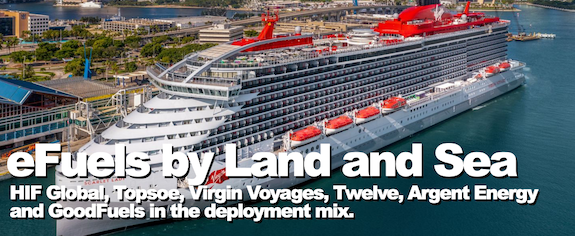eFuels, by land and sea, get their grips on the ships, road trips

For more than a decade we have been covering the emergence of e-Fuels — renewable fuels made from (usually waste) CO2 and green hydrogen, the latter conventionally obtained by splitting water using spare, intermittent renewable power.
It’s been a story of a fuel defeated by policy. Simply put, most early-day carbon thresholds were so low, that high-risk, high-reward fuels like eFuels sat on the sidelines. You could about the same amount of money by fermenting corn to make ethanol — so, why bother?
Times changed with the low-carbon fuels standard era, and even the old corn ethanol industry is a hotbed of transformative decarbonization activity. And eFuels are coming into their own.
EFuels at Sea
The most spectacular news of the week on the eFuels front, though not the largest in capacity, comes from practically out of the Digest’s editorial windows — from the the Miami cruise port and London comes news that Virgin Voyages is working to make its cruise ships more sustainable, through partnerships with independent sustainability experts the Roundtable on Sustainable Biomaterials, and three leading waste-based sustainable fuel providers.
Following months of research, Virgin Voyages has taken an important step towards a low-carbon future by establishing these key partnerships and is working with multiple partners on sustainable marine fuel supply.
Because there’s no one-size-fits-all low-carbon fuel solution, Virgin Voyages will work with three partners through long-term partnerships to develop the best solutions. And the lucky three are:
Twelve – the carbon transformation company with revolutionary technology using air (not oil) to produce materials and fuel sources
Argent Energy – The European waste-based biodiesel producer with a vision to help decarbonize transport worldwide
Good Fuels – Global market leader of accelerating the transition from harmful emissions into sustainable marine fuel by implementing waste-based technology
Adopting sustainable fuels, such as those made from waste, or direct air capture of CO2, is essential for reaching net zero by 2050. Virgin Voyages estimates that by switching to sustainable marine fuels, the line will reduce its life-cycle carbon emissions from fuel by 75% or more.
EFuels on Land
If you find yourself looking for transformative capacity building on land, worry not. It’s lacking the pizzazz that Sir Richard Branson brings, but the news that HIF Global is partnering with Topsoe for an eFuels facility in Texas is even bigger news from a capacity point of view, and comes attached to that very important word, “now”.
Topsoe, a global leader in carbon emission reduction technologies, will deliver technology to HIF Global’s (HIF) planned eFuels facility in Texas. The plant will produce carbon-neutral fuel – enough to decarbonize over 400,000 vehicles annually.HIF´s facility in Texas will help remove 2 million tonnes of CO2 from the air every year.
Topsoe will deliver the basic engineering and license for methanol synthesis and TIGAS gasoline synthesis technologies. Later in the project, Topsoe’s scope will be extended to supply methanol reactors and catalysts. The gasoline synthesis from methanol has been commercially proven in a 15000-bpd plant in Turkmenistan since 2019.
The plant will be built in Matagorda County in Texas, USA. That’s roughly halfway between Houston and Corpus Christi. It will produce 200 million gallons per year of a carbon-neutral gasoline that can be used in today’s cars and gas stations with no modifications required. The power requirement for the plant will be 2 GW, where 90% is consumed by electrolyzers for the green hydrogen production process.The eGasoline produced will meet the strict California specifications for conventional gasoline.
When? Practically right away. Start of construction is expected by 2023 and first production by 2026.
The Bottom Line
eFuels have found their time. It’s not just the low carbon attributes and their popularity right now. It’s all the Net Zero pledges. Crucially, it’s the looming availability of abundant green hydrogen as wind and solar developers try to utilize the intermittent power to split water.
Reaction from the stakeholders
“In order to significantly reduce our carbon footprint further, we must transition to lower-carbon fuel sources as soon as possible. We could do this today with our existing engines if more sustainable ‘drop-in’ fuels were available in our ports of call. Unfortunately, these fuels are not yet widely available, and in most cases, are not cost competitive. We want to work with partners to pioneer for the essential change,” said Tom McAlpin, CEO of Virgin Voyages.
“Virgin will always aim to be a leader in the industries we operate in,” added Richard Branson, founder of the Virgin Group. “We aspire to make the cruise industry better in many ways including through climate action. I’m proud that Virgin Voyages will be working with industry partners and others to shape the future of more sustainable cruise travel and to bring about a real sea change for all.”
On the Renato Pereira, CEO at HIF USA, said: “We look forward to partnering with Topsoe and utilizing its state-of-the-art technology within our Matagorda County facility. Carbon-neutral eFuels represent the energy sector’s next frontier, enabling renewable resources to fuel our mobile economy.”
Roeland Baan, CEO at Topsoe, said: “We are proud that HIF Global has selected our technology for this truly innovative project which will contribute to decarbonizing US transportation. This is our first involvement in a commercial scale Power-to-X facility producing gasoline. Our technology will be used to directly convert renewable hydrogen and CO2 to methanol, which is further converted into plug and play gasoline. We are excited to showcase our capabilities in this field and apply the Topsoe methanol and TIGAS technology for eFuels.”
Category: Top Stories















